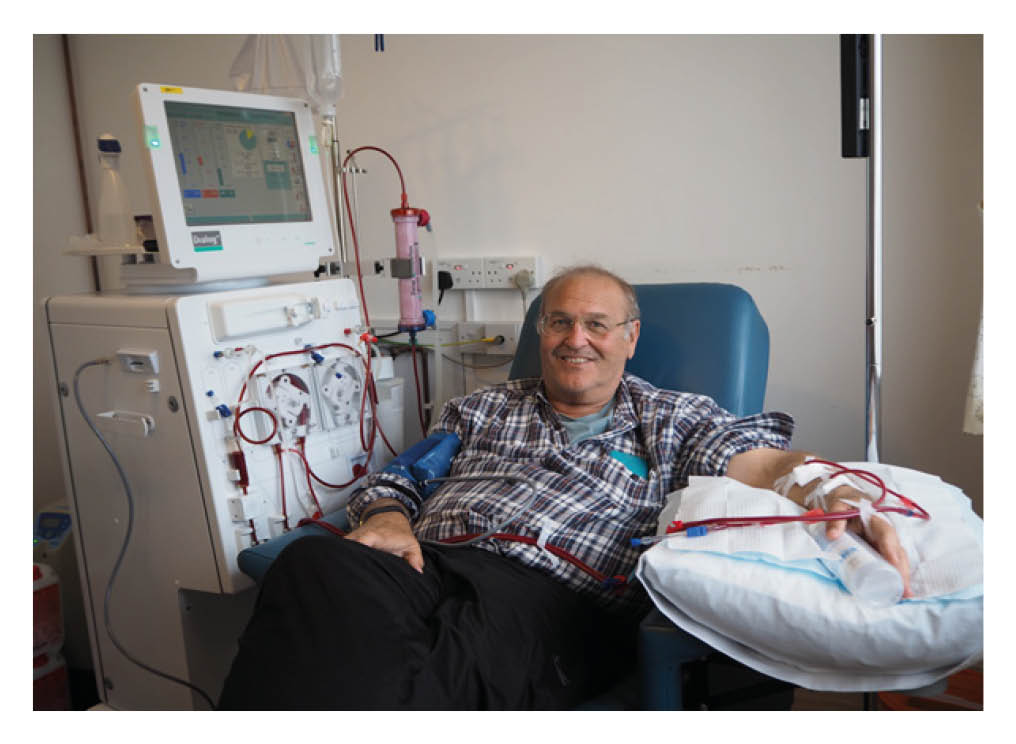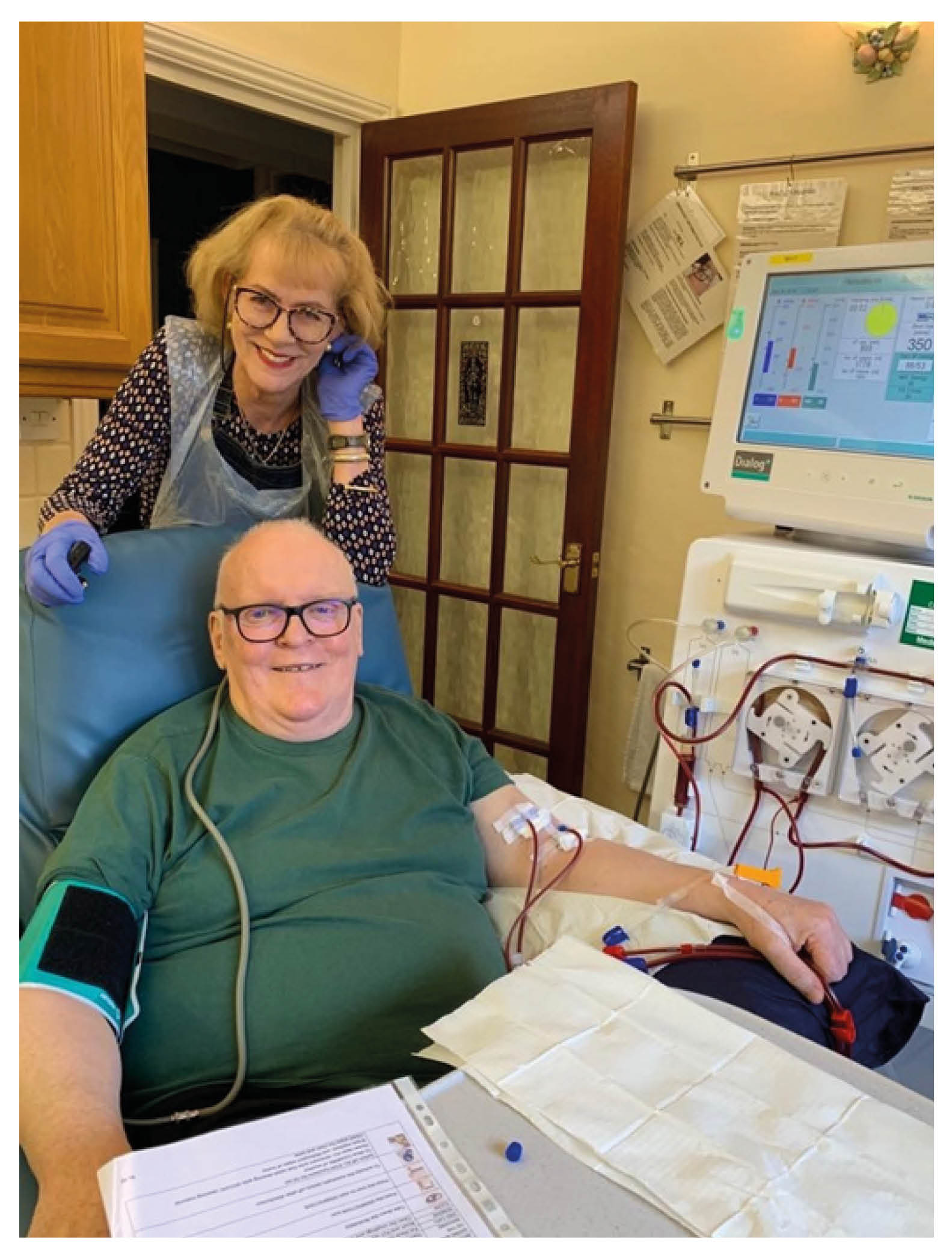Home haemodialysis
Information for patients and carers
Having dialysis at home has a clear advantage, as you can have your dialysis treatments on days and at a time most convenient to you. You will also be able to have more treatments each week.
What are the main benefits to dialysing at home?
Improved quality of life and wellbeing.
Improved overall health.
Greater flexibility of treatments, you can decide when and how many treatments to have.
Less time spent travelling to and from hospital and waiting for treatments.
It may be possible to reduce / review your medications, as your blood levels further stabilise.
More freedom with fluid and diet allowances.
Can anyone use dialysis at home?
No. Dialysis at home is not appropriate for all patients. The following are some things you and your healthcare team will need to consider before any decisions are made.
You need to be well motivated and committed to carrying out your own treatments.
You need to be well when on dialysis.
You must have no other disease or complication that might make home haemodialysis unsafe or unsuitable (as assessed by a renal consultant).
You must have a good working fistula or graft, or in some cases a tunnelled dialysis line.
You must have one or more carers who has made an independent and informed decision to take on joint responsibility for your treatment. If you do not have a carer to share this responsibility with, you may be able to safely dialyse on your own, with advanced skills training. This is assessed on an individual basis.
You must have suitable space and facilities in your home, or an area that could be adapted.
You must be able to show a responsibility of care to yourself and to others. This means you are able to make safe responsible decisions about all aspects of your care and your carer’s needs.
How often can I have dialysis at home?

Most patients have dialysis at home four to six times a week, and report feeling very well.
The more frequently you have dialysis, the shorter the sessions need to be, due to reduced build-up of toxins in your blood stream.
Is my home adequate for dialysis?

We will need to check your home to make sure you have adequate water pressure, space, and drainage. The ideal area for the machine would be next to the bathroom or kitchen, but again this will be discussed with you.
If your home is rented, we will need to contact your landlord to get permission to use the dialysis equipment in their property.
Each home will need alterations, but these are quite basic. They involve accessing your mains drain and water supply, and installing electrical sockets specific for dialysis.
Who will show me what to do?
The training itself is mainly given at Kent and Canterbury Hospital.
The training schedule and location can be flexible; this will be discussed with you in more detail nearer the time.
How long does the training take?
How long the training takes will vary, as everyone learns differently. Most people develop their skills and knowledge within a few weeks, and gradually carry out dialysis on their own within six to eight weeks.
How often are my dialysis supplies delivered?
Your supplies will be delivered monthly, directly to your home.
How is my equipment maintained?
The dialysis machine is serviced regularly by our renal technicians. These staff also provide an on-call service, and will come to your home if your machine stops working properly.
Do I pay for my treatment?
No. All installation costs are paid for by the hospital. This includes the costs of using electricity for your dialysis treatments: the hospital will reimburse these costs. The water used for dialysis-reimbursement can be claimed through the national scheme WaterSure, if you are on a water meter.
Can I use dialysis overnight?
Overnight home haemodialysis is available once you have been stable at home for at least three months; this gives an added benefit as your daytimes are free again.
Patient safety will continue to be monitored at home. However, you will need to come back to the unit / hospital-based dialysis if any of the following happens.
You become unwell, home dialysis will need to temporarily stop until you are fit to start again.
Your long-term health changes / deteriorates (gets worse) and you are no longer safe to continue dialysis at home.
Your home or personal circumstances change.
You no longer wish to continue on home dialysis.
In these circumstances, further support and discussion will be given. Unit-based dialysis, in either the short- or long-term, may be needed.
However, please be aware that the unit dialysis given will depend on your health needs and the days and times available, and these may not fit in with your normal schedule at home.
Can I have dialysis at home if I am having a kidney transplant?
If your renal consultant has discussed with you the option of having a ‘live’ kidney transplant from a family or friend, then unfortunately going onto home haemodialysis would not be possible but this can be discussed with you in more detail if you want.
However, another form of home dialysis may be available to you called Peritoneal Dialysis. If you wish to know more about this option, please ask a member of the Renal Team.
Further information
There are several websites that include further information and videos which you may find helpful when making your decision.
Our patients / carers who are already using dialysis at home, would be happy to discuss with you their experiences. Please ask your Home Dialysis Nurse for more information. There is a departmental support group, and meetings are held throughout the year.
What if I have questions or concerns?
If you have any questions about home dialysis, please speak to your dialysis unit or one of the Home Haemodialysis Nurses on 01227 783025.